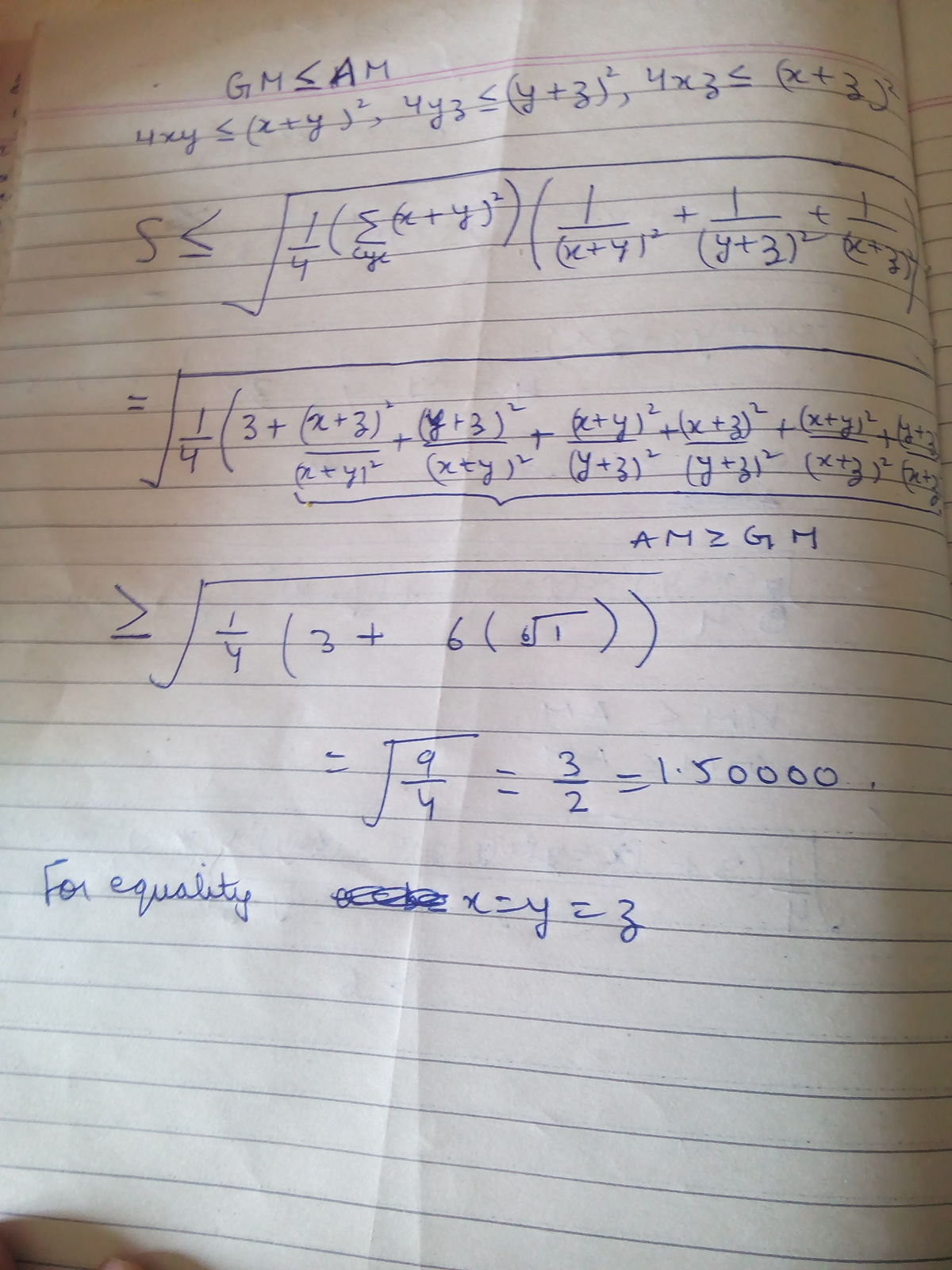Cool Inequality 10 Trouble some
( x y + y z + z x ) ( ( x + y ) 2 1 + ( y + z ) 2 1 + ( z + x ) 2 1 )
If x , y and z are positive reals, find the minimum value of the expression above.
The answer is 1.50000.
This section requires Javascript.
You are seeing this because something didn't load right. We suggest you, (a) try
refreshing the page, (b) enabling javascript if it is disabled on your browser and,
finally, (c)
loading the
non-javascript version of this page
. We're sorry about the hassle.
4 solutions
This does not actually show that 1.5 is the minimum.
For example, say we have a non-negative real number x and we are looking for the minimum of x + 3 . Using the same logic as your solution, we have: x + 3 ≤ x + 5
x + 5 ≥ 5
So the minimum of x + 3 is 5 .
This is clearly untrue.
Log in to reply
Equality condition is important, in my solution equality at any step implies equality at all steps. What you stated x+3 ≤ x+5 has equality when x+3=x+5 or 3=5 which is absurd!!
Log in to reply
Okay, new example.
We have non-negative real numbers x and y and we are looking for the minimum of x 2 + y 2 + 1 4 x y + 1 .
By AM-GM, x 2 + y 2 + 1 2 x 2 + 2 y 2 + 1 ≥ x 2 + y 2 + 1 4 x y + 1 with equality when x = y .
x 2 + y 2 + 1 2 x 2 + 2 y 2 + 1 ≥ 1
So the minimum of x 2 + y 2 + 1 4 x y + 1 is 1 .
This is untrue because the minimum of x 2 + y 2 + 1 4 x y + 1 does not occur when x = y .
For your proof to actually work, you must now prove that the minimum of the original problem occurs when x = y = z .
This problem was in Iran Mathematics Olympiad 1996 and my solution is applying Schur inequality. Prove that A= ( x y + y z + x z ) [ ( x + y ) 2 1 + ( y + z ) 2 1 + ( z + x ) 2 1 ] ≥ 2 3 Or A 2 ≥ 4 9
Rewrite the polynomial we have: ∑ 4 x 5 y − x 4 y 2 − 3 x 3 y 3 + x 4 y z − 2 x 3 y 2 z + x 2 y 2 z 2 ≥ 0 By applying Schur inequality we have: x ( x − y ) ( x − z ) + y ( y − z ) ( y − x ) + z ( z − x ) ( z − y ) ≥ 0 ⇔ ∑ x 4 y z − 2 x 3 y 2 z + x 2 y 2 z 2 ≥ 0 − ( 1 ) By applying AM-GM we have: ∑ ( x 5 y − x 4 y 2 ) + 3 ( x 5 y − x 3 y 3 ) ≥ 0 − ( 2 ) From (1)+(2) we have the solution
For minimum value, let x=y=z=1
Comeon lakshay did you seriously had to write upto 5 decimal places?
Log in to reply
I think... to confuse people!
Of course and please tag me like this @Shreyash Rai so we can talk.
Log in to reply
neat trick K thats what ill do @Lakshya Sinha .
See ,told u let it gain level.Simple cauchy one in the end simplifies to 1/2+1/2+1/2
Right?
Log in to reply
@Kaustubh Miglani – Post the solution
Log in to reply
@Department 8 – IDK latex.In fiitjee i will explain method and u can lateify for me,ok
Why must x=y=z=1?
Log in to reply
That's my intuition on minimum values.. :) sorry i got no proof, hehehe..
I solved it by applying AM-GM 2 times... And condition of inequality came out to be x=y=z = 0 .Previously I had also posted my solution only to delete it accidently and now I am not allowed to post a solution. :(
Log in to reply
you can also solve it by using Cauchy Schwartz inequality. But since im feeling lazy ill let someone else post the solution.
Log in to reply
@Shreyash Rai – I'll latexify my solution(if it's correct) as soon as I'll get time
Is this correct??